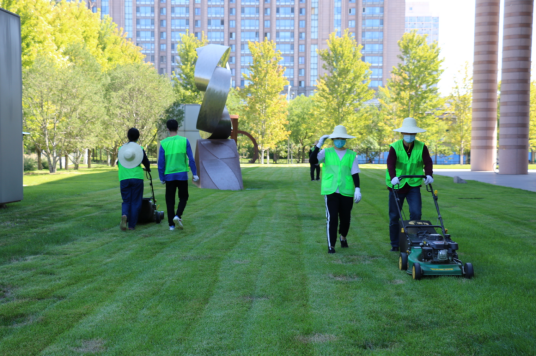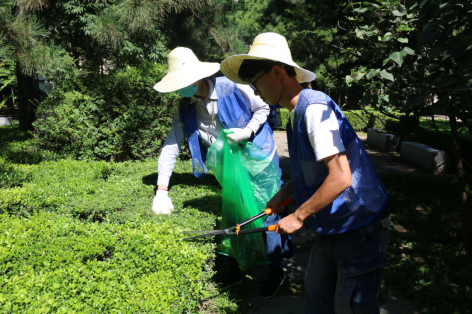Labor-based study is a major compulsory course offered by Xinya College. According to the course requirements, students go to rural areas or factories in the summer semester of their first year at college. They will work in the fields or workshops during the day and study in the evening. Due to the impact of COVID-19, this year's labor-based study got underway on Tsinghua's campus. On August 31, the students enrolled in 2019 began the two-week study, guided by the staff members of the Department of Gardening at Tsinghua University .
What is labor-based study intended to accomplish?
To forget something, or remember something. In the twinkling of an eye, it is now the middle point. The passing of time did not stop me from reflecting on the experience.

DAY 1
On the morning of the first day, the students attended a concise but vital lecture on safety. Labor-based study is a practical course. For us who rarely do manual labor, avoiding safety accidents is also an important part of the course. To raise the students' awareness of self-protection and minimize accidents, Pan from the Department of Gardening introduced the tools that may be used in the course and relevant precautions, possible safety hazards and the methods for preventing them. The students began to understand that the work of gardeners is not easy.
The course officially began after the safety meeting. Contrary to our expectations, it rained heavily in the morning. The task of weeding had to be stopped halfway. The afternoon was allocated for study. Our teacher Li Zhen explained the chapterAdvances inthe Analects of Confuciusin an interesting and detailed way, and the students listened attentively.
In the evening, the groups got together to discuss the problems they encountered in readingthe Analects of Confucius, and exchanged their ideas based on individual life experiences. The fatigue of working did not dampen our interest. We read the soil during the day and studied the mind in the evening, so to speak.
DAY 2&3
The students' main task was to turn over the soil on the second and third days. In addition to shoveling soil, the students needed to put the bricks, gravel and other garbage in one place for a truck to take them away. It was preparation for planting. The staff members of the Department of Gardening introduced how to use shovels, and we did accordingly. After half a day, many students had backaches. Sanitation work was really hard.
On the afternoon of the third day, the staff members of the Department of Gardening gave a lecture on campus landscape planning and transformation. The students learned about the complexity and importance of campus landscaping. Since its establishment, Tsinghua University has made 10 major campus landscape transformations. Each transformation has rendered the campus more beautiful, diversified and culturally appealing. Afterwards, several staff members of the Department of Gardening showed the students around to see the newly built sights on the campus so that they can have a deeper understanding of campus landscape transformation.
We went to areas of the campus that we often ignored and felt the different textures of sidewalks and asphalt pavements with our feet. The rain came down and then stopped, but we kept walking around. I saw a broom in a big tree behind the Eastern Main Building. After the rain, the water on Zijing Tennis Court flashed the same light as the cars parked nearby.
DAY 4
Team A: pruning bushes
Team A trimmed the shrubs in front of the Main Building to beautify the campus. The pruned shrubs were of uniform height and color — neat and lovely. Out of considerations for safety, the students worked in pairs, using garden scissors instead of electric saws. After a busy day, the students sat on the mowed lawn "regardless of their image", filled witha sense of achievement.A staff member of the Department of Gardening said that the work of sanitation workers is much more intensive than we did today. When they rest on grass, passers-by often criticize them. Watching the students pass by on bikes, I suddenly felt I was viewing them from a different angle. I was unable to experience all that sanitation workers experience, yet I understood how hard work is for them.

Team B: medicating trees
Team B were responsible for applying lime sulphur to trees so that the wounds of the trees can heal and they can grow healthily. The students, in blue and green vests, shuttled along the campus river. They carried white barrels of medicine and applied it to the trees. The work was easy, but the weather was sweltering, and mosquitoes were everywhere, making the job a challenge. We all had a sense of fulfillment after one day's work.
DAY 5
Team A: mowing the lawn
On the fifth day, Team A still worked before the Main Building. This time, they mowed the lawn. When the students gathered, they saw the weeding machines prepared by the sanitation workers. They immediately became curious. According to the staff members of the Department of Gardening, each time a boy and two girls were to operate one machine and all would do so in shifts. After work, the students chatted with the sanitation workers — to learn how to mow the lawn and much more that they didn't know yet.
The weeding machine called "Xiaohong" attracted the attention of all the students. For safety reasons, they were not allowed to operate it. The teacher noticed our disappointment. He explained how to use "Xiaohong" during a break and agreed that those who were interested could have a try. The students had the fun of "the bumper car" in front of the Main Building.
Team B: removing weeds
On the morning of the fifth day, Team B gathered inZijing Sculpture Park to remove weeds in the grassy areas.We couldn't wait to remove the weeds which were scattered in front of us. Pulling weeds out of the ground was not as simple as we thought. They were intertwined with ornamental grasses and therefore were difficult to shed. So many students took off their gloves. Their hands got dirty, but they all had a sense of gain.